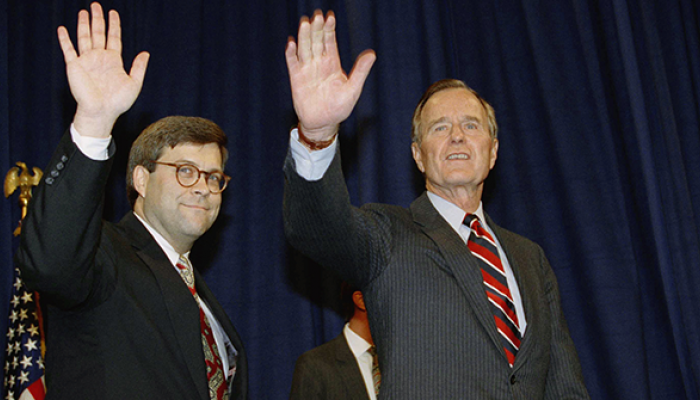President Donald Trump announced Friday his plan to nominate William Barr as the next attorney general. Barr previously held the same role from 1991 to 1993 under President George H.W. Bush. If confirmed by the Senate, Barr would replace Matthew Whitaker, who was appointed by Trump as acting attorney general after Jeff Sessions resigned last month under pressure from the White House.
Barr’s criminal justice positions are out of touch with majority of Congress
As attorney general, Sessions brought back a hardline approach to criminal justice, pushing for tougher penalties and ramping up the war on drugs. There are strong indications that Barr would follow in Sessions’s footsteps. Last month, Barr co-authored an op-ed in the Washington Post that extensively praised Sessions’s criminal justice record. Barr applauded Sessions for restoring “police morale” by pushing back on the “Ferguson effect,” a myth about crime rates and policing that has consistently been disproved by criminologists.
And in 2015, Barr was part of a vocal minority, which included Senator Tom Cotton (R-Ark.), to oppose the Sentencing Reform and Corrections Act (SRCA), a bipartisan bill that would have modestly reduced sentences for federal non-violent drug convictions.
According to research by the Brennan Center, the United States has experienced a sharp decline in crime in the past two decades — and mass incarceration has contributed very little, if at all, to that decline.
Barr’s record suggests he might also be opposed to the FIRST STEP Act, the current bipartisan bill on criminal justice reform. If passed, the bill would shorten some unnecessarily long federal prison sentences and enforce rules that would improve conditions for people currently in prison. Barr’s potential opposition to the FIRST STEP Act would put him at odds with President Trump and the majority of Republicans in the Senate, who support the bill.
Barr’s previous stint as attorney general also included troubling positions on criminal justice issues. During his tenure in the Bush administration, Barr helped devise federal policies that furthered mass incarceration and the war on drugs. Notably, in 1992, he published a book by the Department of Justice called The Case for More Incarceration, which argued that the country was “incarcerating too few criminals.” After serving as attorney general, Barr led efforts in Virginia to abolish parole in the state, build more prisons, and increase prison sentences by as much as 700 percent.
To be sure, that was an era when tough criminal justice policies attracted support across the political spectrum. But Barr’s more recent record suggests, that unlike many in his party, his thinking hasn’t changed significantly since then, even as the failure of mass incarceration has become too glaring to ignore.
Barr’s criminal justice positions deserve scrutiny
If William Barr is confirmed as Trump’s attorney general, he will oversee Special Counsel Robert Mueller’s ongoing investigation into Russian interference in the 2016 election — a task for which he will rightly receive plenty of attention. But as his confirmation process unfolds, lawmakers should pay close attention to his positions on criminal justice, too.
(Image: Associated Press)




